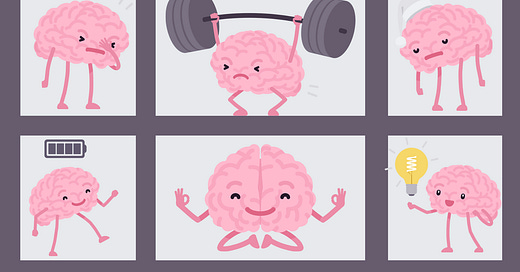After two car accidents in 2023, a diagnosis of post-concussion syndrome, and general frustration, I had to ask my family physician and my physiotherapist what to do. My memory was slow. I often found myself disoriented and confused. I fatigue too quickly (for my liking), and I just didn’t feel like my usual self who thinks quickly. They both introduced me to the idea of cognitive rehabilitation — basically, it's physiotherapy for my brain, and I do it with an occupational therapist.
Cognitive rehabilitation isn’t just for people with brain injuries from car accidents. It could also be for stroke recovery, traumatic injury from a fall or sports, cognitive decline that comes with aging, brain fog from COVID-19, or if you just feel you need to improve your thinking abilities.
I had no idea what to expect, and I was pretty nervous when I went for my initial assessment. I was having constant migraines triggered by lights, computer screens, and general sensory overwhelm. When I was told the assessment was computer-based, I thought it would be really hard for me. And it was, but that was my starting point. The entire goal of the work is to gain tolerance and learn to manage symptoms. Taking breaks, meditating, using aids like light-filtering glasses, and controlling my environment were all things I learned about.
Twice a week, I meet with my occupational therapist or her assistant. Sometimes it’s in person at the physiotherapy clinic. Sometimes it's virtual when I can’t physically be there. We do brain exercises in an online program called HappyNeuron. It’s a science-based, proven methodology and I trust it works because of the research supporting the program.
My appointments are usually an hour. If it’s a bad day, I don’t always make it through. Sometimes I only get 15 minutes in before the light starts messing with my ability to see. We start with some education about concussion, which has helped me understand that this is normal. I’ve been told over and over again: “Improvement is not linear, it's often two steps forward, one step back, and some days are worse than others.” We also practice taking breaks. My exercises are brain games mostly based on memory and recognition, as that’s what my occupational therapist decided I should work on. I do two exercises, then we take a meditation break, then two more.
Working on auditory memory is my favourite game these days. I get pictures of birds, learn their names and calls, and then I have to identify them and their sounds. Now I can recognize bird calls when I’m out walking sometimes. There are also “way-finding” exercises where I have to remember the order of locations on a map, or memory of words and number patterns. I used to take pride in doing well on games like this, but they have humbled me. My mind tires, so I end up confused. But I’m making progress and levelling up on my brain games.
Meditation is a huge part of the program that I didn’t appreciate at first. We stop halfway through the session, turn off the lights and listen to a mindfulness meditation. Initially, I found it annoying and felt like it was a waste of time. I could do it myself. But I wasn’t doing it myself. After a few weeks of this forced practice, I started meditating daily at home in the morning or before bed. I find it really calms down my nervous system and makes it easier for me to recognize when I need a break.
The key is that I stop when I start to feel it’s time for a break instead of pushing through. I’m the kind of person who just wants to get the job done and I’ll take a break later. Not anymore. It doesn’t take much to stop for 10 minutes and close my eyes so I can continue with whatever I was doing, instead of triggering a migraine that puts me in bed for the day.
The whole program was recommended for 12 weeks and I have not yet completed it. My memory is still a challenge and there is still work for me to do. But it also gives me the satisfaction of doing something to help myself along, not just waiting for it to heal. Old-fashioned advice for concussion was to stay in a dark room and rest all the time. This is actively working and training my brain to get better.







An important and useful story published in an Edmonton. community newspaper, Rat Creek Press, now in its 20th year.